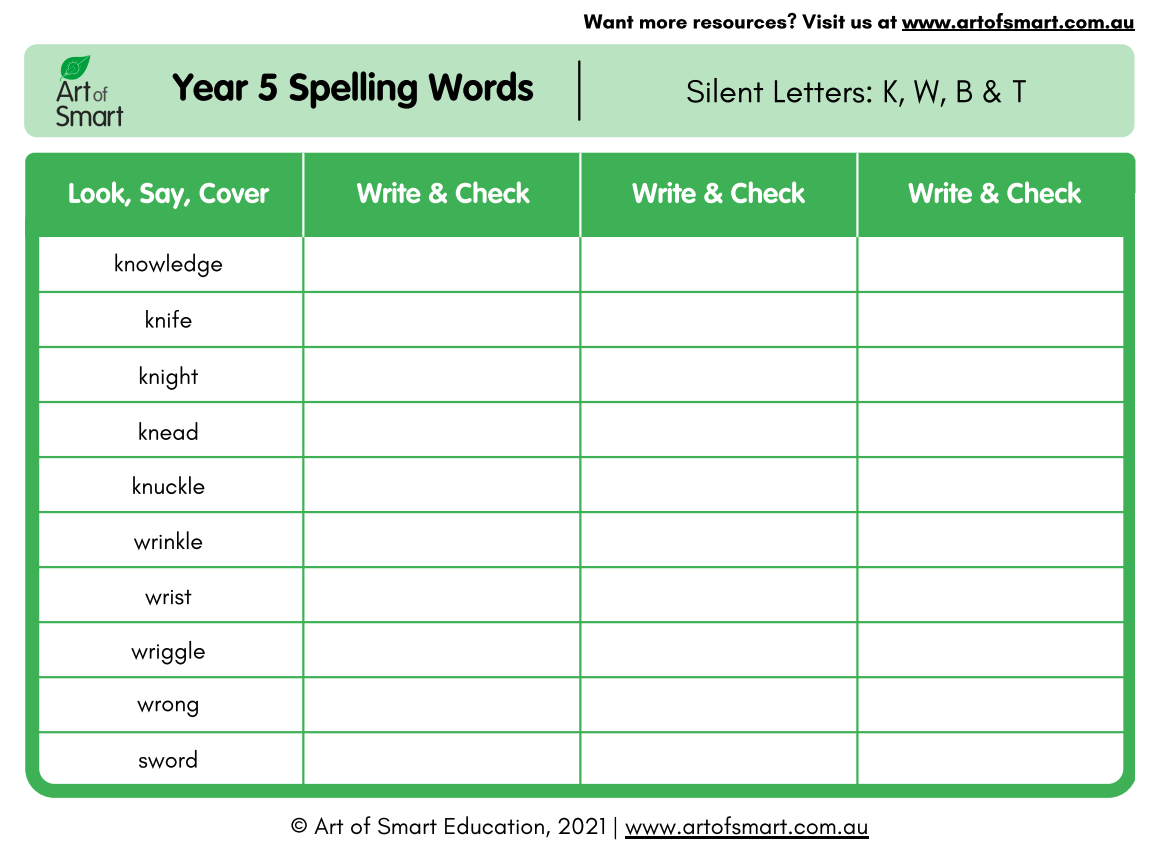Is spelling an area of literacy your child needs to improve on? If so, we’ve got exactly what you need — 100 spelling words for Year 5 students in Australia, plus downloadable worksheets!
Your child will have the opportunity to practise their spelling skills with words suited to their age range. Some of the themes include silent letters, suffixes and prefixes.
For access to our worksheets, keep scrolling!
Sample Year 5 Spelling Words for Students in Australia
Year 5 NAPLAN Preparation
Key English Skills for Year 5 Students
Download Your 100 Year 5 Spelling Words Worksheets
Need spelling sheets for other year groups?
Not to worry, we’ve got plenty of K-6 spelling resources that you can download for FREE!
Kindergarten | Year 1 | Year 2 | Year 3 | Year 4 | Year 6 | Year 7
Sample Australian Year 5 Spelling Words
Unsure what you’ll be downloading?
Here’s a little previous of our worksheets featuring Year 5 Spelling Words for students in Australia organised using “look, say, cover, write and check”.
Following the “look, say, cover, write and check” technique will allow your child to practise reading the words aloud, and then get into the habit of checking their spelling to see if they’ve written the word correctly.
Year 5 NAPLAN Preparation
This year, your child will be sitting the NAPLAN for the second time! They would have initially sat the assessments back in Year 3, and these tests were spread across 3 days.
In these exams, your child will be assessed on:
- Reading & Writing
- Language Conventions
- Numeracy
Learn more about what the NAPLAN involves!
Within the Language Conventions test, there is a section dedicated solely to spelling. Your child will be required to:
- Identify and correct errors in one and two syllable words that follow regular spelling patterns
- Identify and correct errors in less frequently used words with double letters
In terms of how the questions look, here’s a past example from a previous Year 5 NAPLAN test:
The purpose of these NAPLAN tests is to get an understanding of where your child is at academically, which means your child shouldn’t have to study strenuously prior to taking the tests!
By using our worksheets, your child will get into the habit of identifying and correcting any errors in their spelling, which is a key English skill to have.
Although if you’d like your child to become familiar with the layout of the test, there are a bunch of practice tests that can help.
Key English Skills for Year 5 Students
Aside from spelling, your child will be developing other literacy skills such as punctuation and reading. These are all skills that will be assessed in the Year 5 NAPLAN. If you haven’t done so already, check out the English K-10 NESA Syllabus to get an idea of the milestones your child should be aiming for!
Reading
While your child may not be turning to you for guidance anymore with their reading, you can still play a role in helping them develop this skill.
You may get involved by helping to source recommended texts for their skill level in Year 5.
Discover the best books for Year 5 students in Australia!
Punctuation
The main types of punctuation your child will be focusing on are colons, semicolons, parentheses and dialogue.
We have created a range of worksheets for Year 5 students so they can get a better understanding of how to use these different punctuation types in their writing. Check them out below!
Download our FREE Year 5 punctuation worksheets!
Download Your 100 Year 5 Spelling Words Worksheets
If you want access to all 100 Year 5 spelling words, you’ll probably want to download our worksheets below! They’re FREE to download, so what are you waiting for?
Looking for some extra help for your child with English?
We have an incredible team of English tutors and mentors!
We offer tutoring and mentoring for students in Years K-12 in a variety of subjects, with personalised lessons conducted one-on-one in your home, in Sydney suburbs including Penrith, and Hurstville, or at one of our state of the art campuses in Hornsby or the Hills!
We’ve supported over 8,000 students over the last 11 years, and on average our students score mark improvements of over 20%!
Need tutoring for P-6 in the Brisbane area? Check out our one-on-one tutoring options and get paired with an incredible tutor today!
To find out more and get started with an inspirational English tutor and mentor, get in touch today or give us a ring on 1300 267 888!
Alicia Hassell is currently completing her final year of a Bachelor of Education (Secondary) with teaching areas in French, English and EAL/D. Teaching is a big passion of hers, and she loves everything involving languages. In her spare time she likes to read a good book and sew her own clothes!





